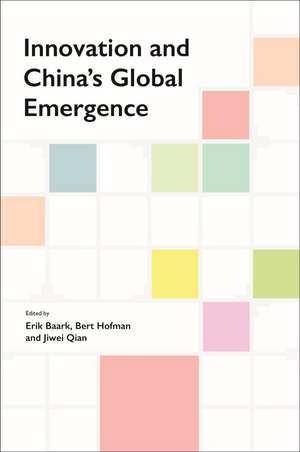Innovation and China's Global Emergence
Editat de Erik Baark, Bert Hofman, Jiwei Qianen Limba Engleză Paperback – 4 aug 2021
As China shifts to an economy driven by innovation and productivity growth, the global implications of this transition will be significant. Amid the rise of techno-nationalism and a changing strategic calculus around the world, the manner and means of China’s transition faces a high degree of scrutiny. China is attempting to balance a reliance on overseas sources of technology alongside efforts to strengthen domestic innovation capabilities as a hedge against the risks of a United States-led “decoupling.”
In these circumstances, it is essential to understand the many different forces of change within China, and the way China responds to outside changes. The evolution of China's innovation economy will be one of the key economic stories of the early twenty-first century, and the world will need China as a source of innovation in the decades ahead. The aim of this book is to help build a better framework for policymakers to find a new equilibrium in negotiating the terms of an oncoming shift in geopolitics.
Preț: 259.00 lei
Nou
Puncte Express: 389
Preț estimativ în valută:
49.56€ • 54.00$ • 41.76£
49.56€ • 54.00$ • 41.76£
Carte disponibilă
Livrare economică 03-17 aprilie
Livrare express 19-25 martie pentru 28.49 lei
Preluare comenzi: 021 569.72.76
Specificații
ISBN-13: 9789813251489
ISBN-10: 9813251484
Pagini: 328
Ilustrații: 20 figures, 21 tables
Dimensiuni: 152 x 229 x 18 mm
Greutate: 0.48 kg
Editura: Nus Press Pte Ltd
Colecția National University of Singapore Press
ISBN-10: 9813251484
Pagini: 328
Ilustrații: 20 figures, 21 tables
Dimensiuni: 152 x 229 x 18 mm
Greutate: 0.48 kg
Editura: Nus Press Pte Ltd
Colecția National University of Singapore Press
Notă biografică
Erik Baark is visiting research professor at the East Asian Institute at the National University of Singapore, and emeritus professor at the Hong Kong University of Science and Technology. Bert Hofman is director and professor at the East Asian Institute at National University of Singapore. Jiwei Qian is a senior research fellow at the East Asian Institute at the National University of Singapore.
Cuprins
1. Introduction: Innovation and China’s Global Emergence
Bert Hofman, Erik Baark and Jiwei Qian
Part One: Implications of China’s Innovation Emergence
2. China and the U.S, Technology: Conflict or Cooperation?
Gary H. Jefferson
3. The US-China Trade War and Myths about Intellectual Property and Innovation in China
Dan Prud’homme
4. Global Implications of China’s Policies on Indigenous Innovation
Erik Baark
5. China’s Talent Challenges Revisited
Cong Cao and Denis Fred Simon
6. China’s International S&T Relations: From Self-Reliance to Active Global Engagement
Denis Fred Simon
7. How Does International Collaboration Lead to Radical Innovation in Latecomer Firms?
Xiaolan Fu, Cintia Külzer-Sacilotto, Haibo Lin and Hongru Xiong
Part Two: Industrial Policy Challenges
8. PRC Industrial Policies Postdate Rather than Lead Economic Activity
Carsten Holz
9. Made in China 2025 and the Proliferation of Intangible Assets
Anton Malkin
10. Industrial Policy and Competitive Advantage: A Comparative Study of the Cloud Computing Industry in Hangzhou and Shenzhen
Bai Gao and Yi Ru
11. Global Value Chains and the Innovation of the Chinese Mobile Phone Industry
Yuqing Xing
List of Contributors
Index
Bert Hofman, Erik Baark and Jiwei Qian
Part One: Implications of China’s Innovation Emergence
2. China and the U.S, Technology: Conflict or Cooperation?
Gary H. Jefferson
3. The US-China Trade War and Myths about Intellectual Property and Innovation in China
Dan Prud’homme
4. Global Implications of China’s Policies on Indigenous Innovation
Erik Baark
5. China’s Talent Challenges Revisited
Cong Cao and Denis Fred Simon
6. China’s International S&T Relations: From Self-Reliance to Active Global Engagement
Denis Fred Simon
7. How Does International Collaboration Lead to Radical Innovation in Latecomer Firms?
Xiaolan Fu, Cintia Külzer-Sacilotto, Haibo Lin and Hongru Xiong
Part Two: Industrial Policy Challenges
8. PRC Industrial Policies Postdate Rather than Lead Economic Activity
Carsten Holz
9. Made in China 2025 and the Proliferation of Intangible Assets
Anton Malkin
10. Industrial Policy and Competitive Advantage: A Comparative Study of the Cloud Computing Industry in Hangzhou and Shenzhen
Bai Gao and Yi Ru
11. Global Value Chains and the Innovation of the Chinese Mobile Phone Industry
Yuqing Xing
List of Contributors
Index
Recenzii
“Those who wish to pronounce on the subject [of China’s status as a rising technology power] might do well to work their way through this book first. The entries are measured and reasoned; there is deafening silence from the absence of axes being ground.”
“This book is a timely addition to the literature discussing the policies and strategies that have put China on the path of rapid technological progress. . . . Bert Hofman, Erik Baark, and Jiwei Qian do a wonderful job of setting the stage for capturing China’s technological progress for the subsequent chapter contributors”.
“The explicit incorporation of the US–China conflict alone makes this book worth reading…. Readers interested in the implications of China’s transformation into an innovation state will gain a significant amount of information from this book’s multifaceted and timely analysis.”
